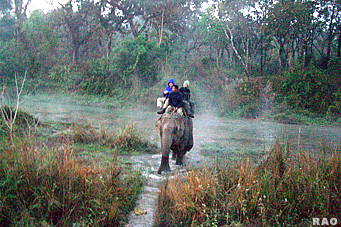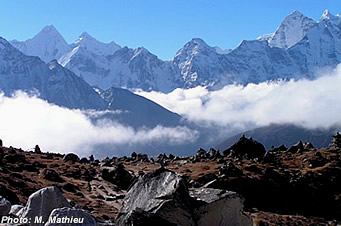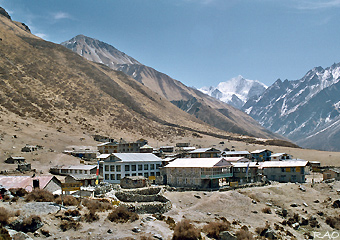| National
Parks and Wildlife Reserves of Nepal |
 |
|
Chitwan National Park is the first national park of Nepal which was established in 1973. Situated
about 90 air km southwest of Kathmandu (175 km by car) in the lowland of inner Terai of
Central Nepal.
The extensive tracts of forested hills, grasslands and river
valleys are the habitat of tiger, rhinoceros, bear, leopard, gaur, samber,
chital, hog deer and a variety of other mammal species in addition to unusually
rich and varied birdlife.
The
park is the site of Gharial crocodile breeding centre. Royal Chitwan National
park has been included in the list of World Heritage Site in 1984 by UNESCO World
Heritage committee. |
|
The
most common ways to get to the park from Kathmandu is by air as there are
number of flights offered by different domestic airlines to Meghauli followed
by few minutes drive or, bus to Tandi via Narayanghat and a couple of hours
of walking to reach the patrk premise. The operating wild life resorts
and camps like the Temple Tiger group, Tiger Tops, Gaida wild life camp,
Island jungle resort, Chitwan Jungle Camp, Machaan, Tiger Mountain and
others may provide their own transport facility or even elephant ride service
through the marshy forest tracks to the campsites.
Concessions
for providing visitor accomodation have been leased by Government both
on the eastern and western sectors of the park. Trained elephants under
park authorities are based in Chitwan and are used extensively for game
viewing. Costs per day vary from as much as above US$ 130 at Tiger Tops
Jungle Lodge to just about US$ 1 at smaller outfits at sauraha outside
the park.
top
 |
| Sagarmatha
National Park is situated
in the northeast of Kathmandu in the Khumbu region of Nepal. It includes
as it does the world's highest mountain, Mt. Everest and several other
wellknown peaks. This area is internationally famous, and is becoming increasingly
popular with tourists in addition to the increasing mountaineering expeditions
every year. Apart from Mt. Everest itself and the splendid mountain scenery,
other attractions include the picturesque Thyangboche monastry and the
colourful sherpa villages in the lower valleys. |
|
There
are number of glacial lakes which drain in three main rivers Bhote Koshi,
Dudh Koshi and Imja Khola. Vegetation varies from pine and hemlock at lower
altitudes to fir, juniper, birch and rhododendron of higher altitudes.
At
12,500 ft. the forest gives way to snow rhododendron and a wide variety
of alpine plant communities before reaching bare rock and snow.There is
blooming of rhododendrons during the spring although most of the flora
are at their most colourful during the monsoon.
The notable fauna that
are most likely to be seen in this area are Himalayan Thar, jhoral, serow
and musk deer. Himalayan black deer (seleneretos thibetanus) is also present
but rarely sighted. More than 115 species of birds are found in the park,
the most common being Danfe (impeyan pheasant), snow pigeon, jungle crow,
skylark and snow partridge.
The
common ways to get to the park are plane flight to Lukla followed by a
couple of days walk or, bus to jiri followed by ten days walk. There are
accomodation facilities with food supplies in places like Namche Bazar,
Thangboche, Pheriche and Lobuche. Teashops along the main trekking
routes provide the trekkers local dishes of simple food.
top
 |
| Situated
to the north of Kathmandu in the central Himalayan region is becoming the
nearest park to Kathmandu. The park includess the beautiful Langtang valley,
the Gosainkund plateau with its sacred lakes, and the forested headwaters
of several rivers rising on the southern slopes of the Langtang - Gosainkund massif.
Though
there are interesting varieties of wildlife including Himalayan bear, Thar,
serow jhoral, musk deer and other animals and birds the chief attractions
to the average visitor are the spectacular alpine scenery and the magnificient
snow peaks of Langtang Lirung and other great mountains. |
|
Besides
Hindus, Buddhists also visit the holy lake Gosainkund, home of Lord
Shiva. The pilgrimages are mostly confined to the period between the end
of july and mid-august. The park is accessible throughout the year by a
combination of motor transport and walking. A stol airstip at Chhong Du
in the upper Langtang valleay is suitable for light aircraft. Helipads
are located at Dhunche, Ghoratabela and Kyangjin. There are park lodges
at Ghoratabela and Kyangjin in addition to some teashops along the
trekking routes.
top
Situated
in the northwest of Kathmandu, the park includes Lake Rara,
Nepal's largest lake, and its heavily forested catchment area, together
with a large part of Chuchumara Dara hills to the south. Located
between 9000'-15000' feet altitude amidst scenically superb surroundings,
this National park provides an ideal focus for tourism in the northwest
region of Nepal. Three days walk north of Jumla, it can also now be reached
directly by air, an air -strip having been constructed on the southern
shore of the lake. The area gives away a considerable variety of wildlife,
while in winter the lake serves as a resting place for duck, geese and
other migratory waterfowl.
The
Rara lake and its surroundings that forms Rara National Park, is situated
at about 370 km northwest of Kathmandu. Much of the park is at an altitude
of about 3000 metres forested by conifers. 20 different species of mammals
such as musk deer, Himalayan Thar, Red Panda, leopard etc and 214 species
of birds like Snow Cock, Coots, Grebes, Mallard etc. are found in the park.
Similarly, the region is also the home to 500 different kinds of flowers
and herbs including rhododendron and juniper.
The
Rara lake is the largest lake of Nepal and the entire Mugu district. The
district is full of bio-diversities and natural beauty. The region can
be turned into a very attractive tourist destination.
|





